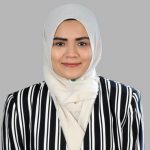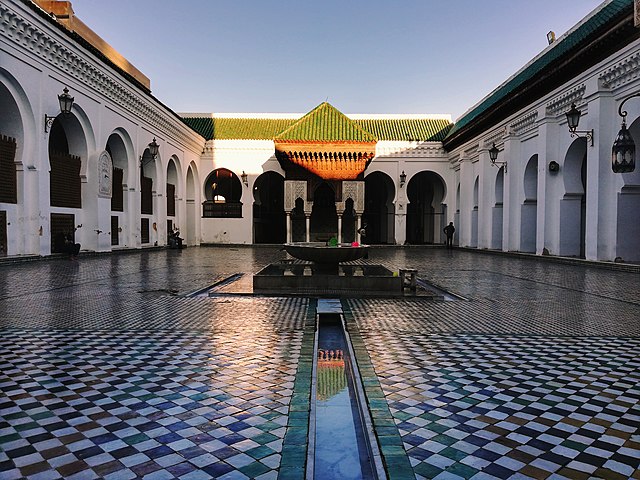

Just 250 miles south of the capital of Tunisia, the northernmost African country and a hidden tourist paradise, lies the city of Al Qarawayan. Though this country is famous for its glorious sandy beaches and historical monuments, what is less known is that this was once the center of learning. Towards the center of Al Qarawyan is a magnificent piece of architecture – the Al Qarawayan Mosque. There are open courtyards within, designed in a way to capture the most illuminating ray of light. The Prayers halls are filled with Splendid columns with a rich paneling of tiles.
The Mosque would have been particularly notable in the 11th century. Aside from being an assembly point for worship, the Mosque was a treasure trove of learning. There was a group of Imams (religious clergy) who were Scholars of medicine. They were known as the ‘Fuqaha al- Badan’. They lent their services to the hospital which was also housed within the Mosque (Al-Qayrawan (Tunisia), 2004). As an illustration of their learning and their unique place in history, this was the only hospital in the world that had a separate ward for lepers. Leprosy was understood not to be a disease then, but an abomination. After all, not only were the Imams here great Scholars of medicine, but this was also the only place that housed a separate ward for lepers at a time when leprosy was considered evil. The celebrated Turkish author Elif Shafak wrote vividly about the leper’s plight- the disease rendering them in such a state that ‘neither the dead nor the living wanted them’. Yet in this sun-kissed hall where scholarship and exchange of ideas took place freely, there was a roof that sheltered those who suffered from this ailment.
Clearly the Mosque was not confined for Prayer alone – it was a center point of activities in medical care and public health. It fed and housed the poor. It cared for the sick. It even housed manuscripts of knowledge and became a beacon of learning for so many revered physicians of that time. This went hand and hand with worshipping a religion whose first word of revelation in The Holy Quran was ‘Iqra’ (‘Read!’).
Today in the modern world there is a recognition of the roles that Places of Worship can play in public health promotion. They are, after all, the heart of any community. They can act as center points for people to come together and be educated on practical steps they can take in their daily lives to keep themselves safe from disease.
These towering Minarets were once the center points of learning. However, it is painful to be reminded of a past that no longer exists. The words that spew from the pulpit are very different today. Tune in the 21st century and we have nothing short of a disaster – ‘trustworthy’ religious leaders have become agents of misinformation, particularly amidst the COVID19 pandemic. There have been videos of Imams lambasting COVID as a conspiracy and even suggesting that the pandemic was an attempt by doctors to earn money — a dangerous move that propelled many to violence against doctors (Taylor, 2020). One paper laments the ‘arrogant attitude’ of faith leaders stating that they ‘feel immune to covid because they pray a lot’ (Suyadi et al., 2020). Previously, faith leaders have been accused of exploiting children behind closed doors – a shockwave that has all but betrayed the trust of worshippers (Raine & Kent, 2019).
Thankfully, even in this travesty, several examples stand as a beacon of light. In Africa, religious leaders played a key role in promoting awareness for preventive measures against Malaria. The movement was so successful that April 25 is now acknowledged as ‘World Malaria day’ (Religious Leaders “Noisy About Malaria” in Mozambique | USAID Impact, n.d.). As one prominent Bishop who helped with the Malaria eradication efforts, Bishop Sengulane, observed: “If a doctor talks about how important it is for you to have your home sprayed, of course, he will talk about those things in those terms because it is how he will get his salary. But when a leader of a Church or Mosque starts talking about health issues, about malaria, then people are ready to listen”.
In the Pakistani city of Faisalabad, there is the village of Odwalla. It has been officially dubbed as the ‘cigarette-free village of Pakistan’ as shopkeepers stopped selling them entirely. This was the fruit of efforts by the Imam of the Mosque, Imam Hafiz Muhammad Amin, who recognized the dangers of smoking and urged not only his audience to give up the habit but also successfully convinced shopkeepers to stop selling cigarettes (Video: The Cigarette-Free Village of Pakistan – SAMAA, n.d.). The fact that this is possible in a country where tobacco kills over 200,000 people annually is no small feat (Pakistan: Time for Stronger Enforcement on Tobacco Control | Blog – Tobacco Control, n.d.)
Ultimately, when it comes to the pulpit, so much has been lost in terms of public health advocacy. If harshness and arrogance rain down from there, it leaves no room for community well-being. Yet I am reminded that every public health campaign demands a certain level of community engagement to be successful. And there is no better driving force that can unite and educate a community more than its religious leaders. As the world moves towards becoming one Global village altogether, perhaps there is a need to rethink how we engage with those who can serve as vectors of knowledge if they so wish.
REFERENCES:
Al-Qayrawan (Tunisia). (2004).
Pakistan: time for stronger enforcement on tobacco control | Blog – Tobacco Control. (n.d.). Retrieved July 29, 2021, from https://blogs.bmj.com/tc/2019/12/12/pakistan-time-for-stronger-enforcement-on-tobacco-control/
Raine, S., & Kent, S. A. (2019). The grooming of children for sexual abuse in religious settings: Unique characteristics and select case studies. Aggression and Violent Behavior, 48, 180–189. https://doi.org/10.1016/J.AVB.2019.08.017
Religious Leaders “Noisy About Malaria” in Mozambique | USAID Impact. (n.d.). Retrieved July 29, 2021, from https://blog.usaid.gov/2013/04/religious-leaders-noisy-about-malaria-in-mozambique/
Suyadi, Nuryana, Z., & Fauzi, N. A. F. (2020). The fiqh of disaster: The mitigation of Covid-19 in the perspective of Islamic education-neuroscience. International Journal of Disaster Risk Reduction, 51, 101848. https://doi.org/10.1016/J.IJDRR.2020.101848
Taylor, L. (2020). Covid-19 misinformation sparks threats and violence against doctors in Latin America. BMJ, 370. https://doi.org/10.1136/BMJ.M3088
Video: The cigarette-free village of Pakistan – SAMAA. (n.d.). Retrieved July 29, 2021, from https://www.samaa.tv/video/2021/06/video-the-cigrette-free-village-of-pakistan/
BCPHR.org was designed by ComputerAlly.com.
Visit BCPHR‘s publisher, the Boston Congress of Public Health (BCPH).
Email [email protected] for more information.
Click below to make a tax-deductible donation supporting the educational initiatives of the Boston Congress of Public Health, publisher of BCPHR.![]()
© 2025-2026 Boston Congress of Public Health (BCPHR): An Academic, Peer-Reviewed Journal
All Boston Congress of Public Health (BCPH) branding and content, including logos, program and award names, and materials, are the property of BCPH and trademarked as such. BCPHR articles are published under Open Access license CC BY. All BCPHR branding falls under BCPH.
Use of BCPH content requires explicit, written permission.